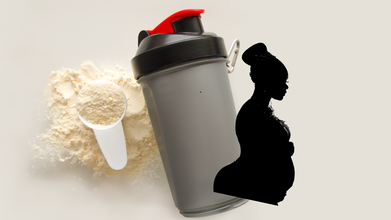- Health Conditions A-Z
- Health & Wellness
- Nutrition
- Fitness
- Health News
- Ayurveda
- Videos
- Medicine A-Z
- Parenting
- Web Stories
Smartphones For Kids Becomes A Common Trend - Average Age For Smartphones Revealed To Be 9

(Credit-Canva)
Nowadays, it is very common to see kids as young as 1st or 2nd graders having phones. While having phones on their person helps parents keep a closer eye on them, but is this much exposure to electronic devices, ok?
A survey reveals that many parents feel pushed to buy smartphones for their kids, even when they have doubts. Researchers studied 500 parents with children aged 8 to 13 found that almost half felt pressured into buying a phone. Another 44% worried their child would feel "left out" without one, showing how big this decision is for families.
Worries and Few Rules
Even though most parents (74%) had concerns at first, a quarter gave their child a smartphone without talking about if they were ready emotionally. The study also showed that a small number of parents (13%) put very few or no limits on phone use. Most of these parents felt their kids would just find ways around any rules anyway.
This study was requested by Motorola to highlight helpful online tools and advice from a UK children's charity. It aims to show the tough choices parents face when getting their child's first phone.
Is There a "Right" Age?
An expert noted that there's no "right" age to give a child their first phone. It really depends on each child and what that family needs. They stressed that parents should think about why their child needs a phone. If it's just for calls and texts, a simpler phone might be better than a smartphone. The expert also highlighted how important it is for parents and kids to talk openly about staying safe online.
Another survey, which included 500 children aged 8 to 13, found that 44% of kids were going online or using apps without their parents knowing. What's more concerning, during this unsupervised time, 31% saw things they felt were not appropriate for their age.
Why Smartphones Are Still Popular
Even with these concerns, most parents are still choosing smartphones over simpler devices for their kids. The main reasons are safety features and GPS tracking, with over half of parents (56%) seeing these as key benefits. A representative from the phone company said, "It's important to ensure children are equipped with the right guidance and boundaries when it comes to smartphone use and internet access." The company is actively working with charities to give parents the tools and information to make smart choices about their children's smartphone use.
Do Smartphones Affects Children’s Health
A 2022 study done by European Child & Adolescent Psychiatry, states that more and more kids and teens are using cell phones and other wireless gadgets. The study found some evidence suggesting that a lot of general phone and device use might be linked to more outward behavior problems like being hyper or aggressive in younger kids and teens. However, the results were less clear for inward problems like anxiety or depression.
Another 2023 study published in the Journal of Therapies & Rehabilitation Sciences, detailed the physical as well as mental aspects of smartphone usage in kids.
Physical Health
Spending too much time looking down at smartphones is really impacting kids' bodies. This often leads to poor posture, where their necks are bent forward for long periods, causing stiffness and pain. It can also limit how much they can move their neck and put extra strain on their spine. Plus, this constant bent-neck position can even affect their breathing, making their lungs work less well and weakening the muscles they use to breathe. These problems are also connected to kids being less fit and sometimes gaining too much weight.
Mental Health and Well-being
Beyond just physical issues, using smartphones too much can also hurt kids' minds and feelings. It can make real-life friendships weaker, leading to kids feeling more lonely and shy around others. Emotionally, a lot of screen time might make them act immature, have unstable moods, struggle to pay attention, and have less self-control. Another big problem is that using phones a lot is linked to more sleep problems, meaning kids aren't getting the rest they need to be healthy and happy.
Drinks That Are Safe To Consume During Pregnancy According To Doctor

Credits: Canva
Staying hydrated during pregnancy is crucial, but not every beverage that quenches thirst is safe for a mom-to-be. From morning coffee to bedtime teas, the choices can get confusing. So, how do you know which drinks are actually good for you and your baby?
We spoke to Dr. Sushruta Mokadam, consultant obstetrician at Motherhood Hospital, Kharadi, Pune, who rated the most common beverages consumed during pregnancy — from best to worst — and explained what makes them safe or risky.
Water
“Water is, without question, the safest and best drink during pregnancy,” says Dr. Mokadam. It aids digestion, maintains healthy circulation, and helps prevent dehydration, constipation, and urinary tract infections — all of which are common during pregnancy.She recommends drinking at least three litres of water daily. “If plain water feels boring, try adding slices of lemon, cucumber, or mint. Detox water can be a refreshing and healthy alternative,” she adds.
Milk
Milk is packed with calcium, protein, vitamin D, and iodine, all vital for the baby’s bone, tooth, and brain development. “Milk is one of the most wholesome drinks for expectant mothers, provided it’s pasteurized,” says Dr. Mokadam.
She advises choosing between low-fat or full-fat milk based on your dietary needs. For those who are lactose intolerant or prefer plant-based options, fortified almond or soy milk can be good substitutes — as long as they’re enriched with calcium and vitamin D.
Fresh Fruit Juices
Freshly squeezed juices provide a good dose of vitamins, minerals, and antioxidants. “Juices like orange, pomegranate, or apple can help boost your well-being,” explains Dr. Mokadam.
However, she cautions against overconsumption: “Juice lacks fiber and is high in natural sugars. One small glass a day is fine, but going overboard can lead to unnecessary calorie intake and affect blood sugar levels.”
Herbal Teas
Many pregnant women turn to herbal teas for relaxation or to ease nausea. “Mild herbal teas like ginger or chamomile in moderation can help with digestion or morning sickness,” says Dr. Mokadam.
But not all herbs are safe. “Avoid teas with licorice root, pennyroyal, or unknown herbal blends. Always check with your doctor before adding any herbal tea to your routine,” she advises.
Coffee and Black/Green Tea
Caffeine crosses the placenta and can affect the baby’s heart rate. “It’s best to limit caffeine to less than 200 mg per day,” warns Dr. Mokadam. That’s roughly one small cup of coffee or two cups of tea. Too much caffeine may increase the risk of miscarriage or low birth weight.
Soft Drinks, Energy Drinks, and Sugary Beverages
These are high in sugar, artificial additives, and caffeine, with no nutritional value. “They can increase the risk of gestational diabetes, excessive weight gain, or even affect fetal growth,” says Dr. Mokadam.
She advises cutting them out completely for better overall well-being.
Is Protein Powder Safe For Pregnant Women?

Credits: Canva
Pregnancy is a time when woman need to be extra careful with what they consume. There are always endless recommendations, and thus sometimes it could be difficult to separate fact from fiction, especially when it comes to protein intake. While protein is essential for everyone, however, during pregnancy, it plays a critical role in maternal health and fetal development.
Why Does It Matter?
A recent study has shown that lead has been found in popular protein powder, and the highest found in whey protein powder, or the plant-based protein powders. This is concerning, as protein are essential during pregnant as they contribute directly to the growth and development of the baby.
Proteins are made up of amino acids- body's building blocks. These amino acids help build and repair muscle and create hormones and produce enzymes.
A study published in Advances in Nutrition highlights that pregnancy is an “exceptional stage of life defined by rapid growth and development.” From just weeks after conception, the body adjusts protein metabolism to support fetal growth. Most protein deposits occur in the third trimester, reinforcing the importance of consistent protein intake throughout pregnancy.
Read: High Levels Of Lead Found In Protein Powders And Shakes, Reveals Consumer Reports
How Much Protein Do You Need?
Recommended protein intake usually varies by country, for instance in Australia, the RDI for pregnant women s around 60 grams per day, whereas 46 grams for non-pregnant women.
Are Protein Powder Safe During Pregnancy?
Yes, they are safe, unless they contain lead and other contaminants, which must be checked by the list published by the Consumer Reports and your local physician, gynaecologist and nutritionist.
There are several plant-based proteins that have the highest lead content in them, they are:
- Whey protein: Derived from milk; contains all essential amino acids. Not ideal for lactose-intolerant individuals.
- Hemp protein: Plant-based, safe for vegetarians and vegans.
- Pea protein: Plant-based, rich in branched-chain amino acids (BCAAs).
- Rice protein: Vegan-friendly, made from brown rice.
What Is An Alternative?
The RDI could be achieved with a manageable and balanced diet that includes:
Complete proteins: Lean meats, fish, eggs, dairy
Combined plant proteins: Legumes with grains or nuts (e.g., peanut butter on whole-grain toast)
A diet rich in fruits, vegetables, whole grains, legumes, nuts, and moderate protein sources, whether plant-based or animal, supports both maternal and fetal health. Weight gain is expected during pregnancy, and incorporating protein helps ensure that gain is nutrient-dense. For individual guidance, consulting a GP or dietitian is recommended.
Other alternatives like protein bars, or homemade bars, which use dates, nut butter, and seeds could be a healthier option as they do not contain added sugar.
Should Parents Limit Social Media For Teens? New Study Shows It Is Lowering Their Memory Score

(Credit-Canva)
Scientists have found that kids' social media use might be slowing down their brain power. A new study says that spending time on these apps could be hurting how well a tween's mind develops. This research shows that the more time kids spend on platforms like Instagram or TikTok, the worse they might do on school-related tasks later on.
How Does Social Media Affect Our Health?
The researchers found that children aged 9 to 13 who used social media more often did worse on tests that measured skills like reading, memory, and language. They were tested on these abilities two years after the study began. The results were published in a major medical journal called the Journal of the American Medical Association.
The lead scientist, Dr. Jason Nagata, explained that even using social media for a short time each day was connected to poorer results on these brain-power tests. He suggested that the brains of young tweens might be extra sensitive to social media. This means parents need to be careful about when they let their kids start using these apps and how much time they spend on them.
How Did Social Media Affect Kid’s Academics?
To figure this out, the researchers looked at information from over 6,500 children across the country. These kids were all part of the Adolescent Brain Cognitive Development (ABCD) Study, which is the biggest study ever done in the U.S. to track how children's brains grow over time. They sorted the kids into groups based on their social media use:
- Over half (58%) of the kids barely used social media at all.
- More than a third (37%) were using social media for about one extra hour every day by the time they turned 13.
- A small group (6%) were using social media for up to three extra hours a day by age 13.
The children's brain power was measured using special tests created by the National Institutes of Health, which tested things like how well they remember information and understand language. The study found a clear, but small, drop in the test scores for kids who used social media.
- Kids who used social media for just one extra hour a day scored about 1 to 2 points lower on their memory and reading tests.
- Kids who used social media for up to three extra hours a day saw a bigger drop, scoring as much as 4 points lower.
Why Is Important To Restrict Your Child’s Social Media Usage?
Dr. Nagata explained that even though these differences seem small, they are very important because they were seen again and again across the children. Since reading and memory are the most important skills for learning, even these small dips in scores, when seen across thousands of kids, could be a problem for education as a whole.
The scientists think the problem is that social media is so fun and engaging that kids might choose to scroll instead of doing homework or reading. This time shift could be hurting their learning. The researchers stress that creating good screen habits early on can help protect a child’s learning and brain growth.
The results of this study support actions already being taken, such as schools trying to limit student phone use during the day. The findings also provide backing for bigger changes, like making the age limits for social media access even stricter than they are now.
However, the researchers want to be clear about one thing: because they were only watching the kids' behavior (it was an observational study), they can't say for sure that social media causes the lower test scores. They can only say that there is a clear association between the two.
© 2024 Bennett, Coleman & Company Limited

